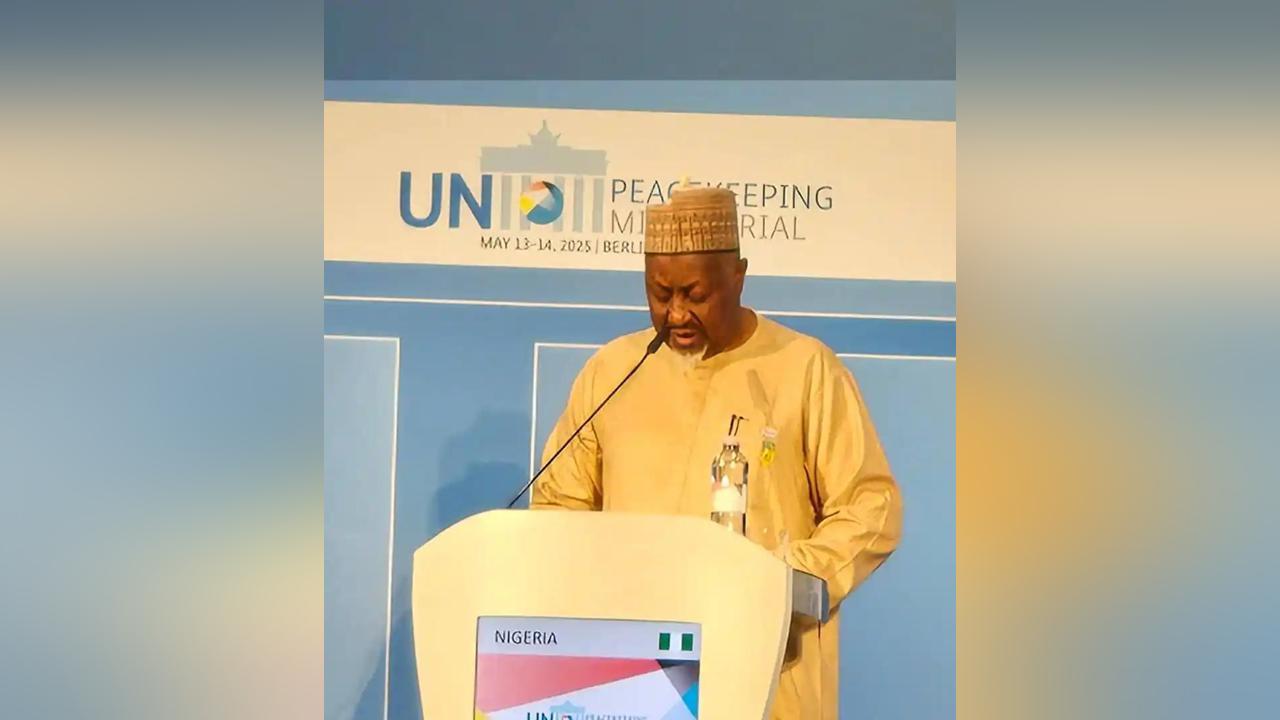By Abba Hamisu Sani
Africa-Press – Nigeria. Nigeria has recently reiterated its commitment to participating in United Nations peacekeeping operations.
The new pledges include five additional commitments aimed at enhancing Nigeria’s preparedness and capacity to respond to international peacekeeping needs. Although the specific nature of these commitments was not disclosed in the official statement, defence sources suggest they may involve logistics, personnel, training, and deployment readiness.
Nigeria’s Minister of Defence, Mohammed Badaru Abubakar, declared the country’s commitment at the 2025 United Nations Peacekeeping Ministerial held in Berlin, Germany.
He emphasized Nigeria’s readiness to assume a greater global role by strengthening its contributions and expanding its pledges to peacekeeping operations.
These remarks underscored Nigeria’s long-standing contributions to global peacekeeping and highlighted the country’s intention to further bolster its involvement in future missions.
Nigeria Remains Resolute in Supporting UN Missions
Minister Badaru reaffirmed that Nigeria remains committed to supporting the United Nations and the global community in promoting peace, security, and stability.
He noted that Nigeria currently maintains a rotation of its Base Protection Force with the United Nations Interim Security Force in Abyei (UNISFA) and has deployed a Formed Police Unit with the United Nations Transition Mission in Somalia (ATMIS). These deployments reflect Nigeria’s enduring legacy in peacekeeping, especially across the African continent.
Beyond the United Nations, Nigeria continues to play a leading role in peace and security initiatives under the Economic Community of West African States (ECOWAS) and the African Union (AU). Minister Badaru referenced Nigeria’s historic interventions in Sierra Leone, Liberia, and more recently, The Gambia and Guinea-Bissau—missions credited with helping stabilize fragile governments and prevent the regional spread of conflicts.
A Legacy of Peacekeeping Leadership
Nigeria’s involvement in peacekeeping missions dates back to the early 1960s, shortly after gaining independence, with its first major contribution to the United Nations Operation in the Congo (ONUC). Since then, Nigeria has consistently been a major contributor of troops and police personnel to numerous UN peacekeeping missions around the world.
Between 1962 and 1963, military observers were deployed to New Guinea, and in 1964, a battalion was sent to Tanzania under a bilateral agreement. In 1965–1966, Nigeria deployed military observers to participate in the United Nations mission during the India-Pakistan conflict.
Nigeria’s participation in peacekeeping is also driven by its desire to strengthen its role in regional organizations such as the African Union (AU) and ECOWAS.
Countries where Nigeria has deployed peacekeeping personnel include Liberia, Sierra Leone, Sudan, South Sudan, and Mali.
Available data indicates that Nigeria has participated in 41 peacekeeping operations worldwide, spent over $8 billion in peace efforts in Liberia alone, and deployed more than 200,000 troops to serve in UN missions globally. Nigerian senior military officers have also commanded several of these missions.
Peacekeeping Amid Domestic Challenges
“This is a strategic step to reinforce our ability to respond quickly and efficiently when called upon by the United Nations,” said a senior military official familiar with the developments, speaking on condition of anonymity.
Nigeria’s renewed peacekeeping ambitions come at a time when the country is grappling with worsening security challenges at home, including insurgency in the Northeast, farmer-herder conflicts in the Middle Belt, and escalating banditry and kidnappings across the nation.
Dr. Funmilayo Adebayo, an international security expert at the Nigerian Institute of International Affairs (NIIA), acknowledged that many critics question whether Nigeria can afford an expanded international role while its domestic security apparatus is already overstretched.
However, proponents argue that Nigeria’s active engagement in global peacekeeping enhances its international standing, provides valuable experience for its armed forces, and strengthens bilateral defense partnerships.
Dr. Adebayo further emphasized that peacekeeping enables Nigeria to maintain its influence on the global stage and shape international security narratives from an African perspective.
Recognizing Nigeria’s Peacekeeping Efforts
Jibrin Bala, a specialist in African history and development studies, stated that Nigeria’s role in peacekeeping efforts across the African continent cannot be overemphasized and deserves greater recognition from world leaders.
“Nigeria, as the giant of Africa, has committed substantial resources and deployed its military to address security threats within ECOWAS and across the continent. Its peacekeeping missions in Sierra Leone, Liberia, The Gambia, and Guinea are noteworthy gestures of African solidarity,” he remarked.
Nigeria’s Foreign Policy and Africanism
Nigeria’s foreign policy is rooted in promoting African unity and integration, alongside fostering international cooperation, peace, and mutual respect. It also emphasizes the protection of national interests, adherence to international law, and advocacy for a fair global economic order.
According to Bala, Nigeria’s foreign policy is deeply rooted in Africanism—prioritizing the continent’s stability, development, and unity.
“As a regional leader, Nigeria seeks to play a central role in West Africa, particularly through ECOWAS, and aspires to exert hegemonic influence in the region. These roles position Nigeria as a ‘big brother’ to other African nations,” Dr. Jibrin noted.
He added that while Nigeria actively engages in global organizations, it generally maintains a non-aligned stance, aiming to avoid undue influence from any particular power bloc.
Nigeria consistently advocates for the peaceful resolution of conflicts through negotiation, mediation, and adherence to international law. It also supports economic cooperation and integration both within Africa and globally, while safeguarding its national interests—including the protection of its citizens and legal entities abroad.
For More News And Analysis About Nigeria Follow Africa-Press







